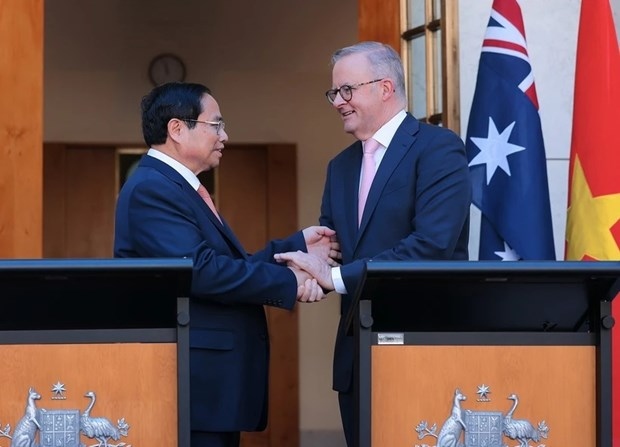Vietnam-Australia ties become more effective, substantial: Scholars
The outcomes of Vietnamese Prime Minister Pham Minh Chinh’s official visit to Australia, especially the upgrade of the Vietnam-Australia to a comprehensive strategic partnership, have opened up a new chapter in the bilateral relationship that is growing deeper, more effective and substantial, commented scholars.

Dr. Le Hong Hiep, an expert at the ISEAS – Yusof Ishak Institute of Singapore described the upgrade as a new step forward in the ties between the two countries, affirming the importance of the relations to the external policy of each country.
The scholar noted that the upgrade was made only six years after Vietnam and Australia established their strategic partnership in 2018, reflecting the strong growth of bilateral relations, and the two countries’ awareness of the significance of elevating their relations to better respond to strong geo-political changes in the region.
The lifting of relationship to the highest level will allow the two sides to further strengthen their cooperation in the future, said Dr. Hiep, adding that the Vietnamese PM’s visit also affirmed Vietnam’s rising role and position, while showing the increasing importance of Vietnam in Australia’s external policy.
Meanwhile, Dr. Tran Thi Bich from the Lee Kuan Yew School of Public Policy of Singapore said that among the areas of cooperation stated in the joint statement on Vietnam-Australia comprehensive strategic partnership, political, defence, security and judicial collaboration are listed first, demonstrating increasing bilateral strategic trust in the context that the two countries share many strategic interest and visions.
Regarding the cooperation prospects between Vietnam and Australia after the upgrade of relations, Dr. Hiep held that there is plenty of room for the two sides to promote cooperation, especially in economy.
He predicted that two-way trade will continue to rise, along with their investment relations due to higher capacity of Vietnamese firms in investing abroad and Australian enterprises’ efforts to seek favourable investment destinations. Besides, bilateral cooperation in politics-diplomacy, security-defence will also expand within the newly-established comprehensive strategic partnership, he said.
Meanwhile, collaboration in traditional areas such as education-training, labour and tourism will continue to be strengthened. Australia has provided a large number of scholarships to Vietnamese students and officials, he noted, advising Vietnam to strengthen partnership with Australia in this field to enhance its human resources quality.
Dr. Bich asserted that other areas included in the joint statement announcing the Vietnam-Australia comprehensive strategic partnership such as economic cooperation, knowledge building and people-to-people connection, especially human resources training, energy and technology collaboration, are areas of Australia’s strength and Vietnam’s interest. In her opinion, cooperation with Australia will significantly contribute to Vietnam's economic development, clean energy transition and digital economy expansion.
Dr. Hiep said that the elevation of ties between Vietnam and Australia will also create favourable conditions for the growth of the ASEAN-Australia ties in the time to come. Vietnam and Australia should increase exchange and coordination to effectively resolve regional issues of mutual concern in ASEAN-led forums, including the East Sea issue and matters related to the Mekong River, supply chains, climate change response, and non-traditional security issues such as maritime security and epidemics.
Sharing Dr. Hiep’s opinions, Dr. Bich said that Vietnam has played a rising role in ASEAN. From a member that joined the grouping late and lagged behind in some aspects, Vietnam has become an active member and with significant contributions to ASEAN activities, she said, stressing that stronger bilateral relations with Vietnam will help Australia strengthen relations with ASEAN.


